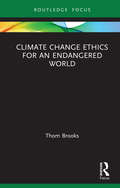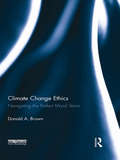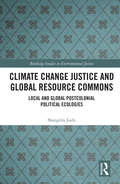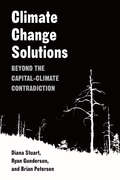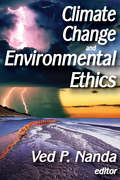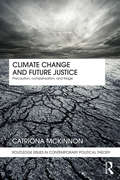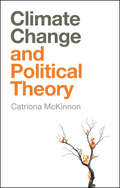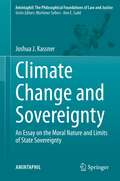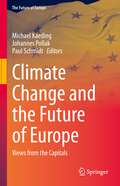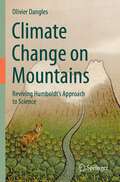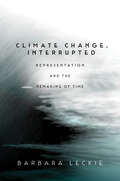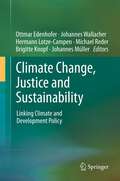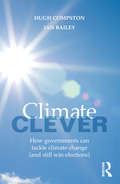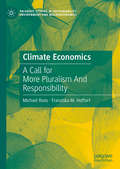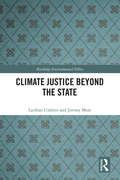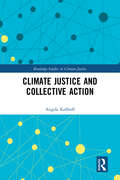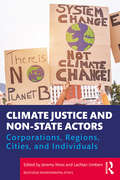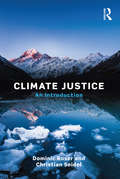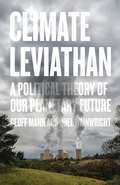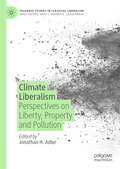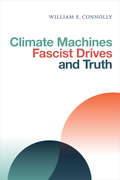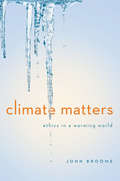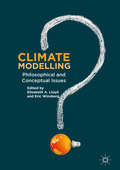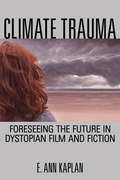- Table View
- List View
Climate Change Ethics for an Endangered World (Routledge Focus on Environment and Sustainability)
by Thom BrooksClimate change confronts us with our most pressing challenges today. The global consensus is clear that human activity is mostly to blame for its harmful effects, but there is disagreement about what should be done. While no shortage of proposals from ecological footprints and the polluter pays principle to adaptation technology and economic reforms, each offers a solution – but is climate change a problem we can solve? In this provocative new book, these popular proposals for ending or overcoming the threat of climate change are shown to offer no easy escape and each rest on an important mistake. Thom Brooks argues that a future environmental catastrophe is an event we can only delay or endure, but not avoid. This raises new ethical questions about how we should think about climate change. How should we reconceive sustainability without a status quo? Why is action more urgent and necessary than previously thought? What can we do to motivate and inspire hope? Many have misunderstood the kind of problem that climate change presents – as well as the daunting challenges we must face and overcome. Climate Change Ethics for an Endangered World is a critical guide on how we can better understand the fragile world around us before it is too late. This innovative book will be of great interest to students and scholars of climate change, climate justice, environmental policy and environmental ethics.
Climate Change Ethics: Navigating the Perfect Moral Storm
by Donald A. BrownClimate change is now the biggest challenge faced by humanity worldwide and ethics is the crucial missing component in the debate about what to do about this enormous threat. This book examines why thirty-five years of discussion of human-induced warming has failed to acknowledge fundamental ethical concerns, and subjects climate change’s most important policy questions to ethical analysis. This book examines why ethical principles have failed to gain traction in policy formation and recommends specific strategies to ensure that climate change policies are consistent with ethical principles. Because climate change is a global problem that requires a global solution and given that many nations refuse participation due to perceived inequities in proposed international solutions, this book explains why ensuring that nations, sub-national governments, organizations, businesses and individuals acknowledge and respond to their ethical obligations is both an ethical and practical mandate. This book is the first of its kind to go beyond a mere account of relevant ethical questions to offer a pragmatic guide on how to make ethical principles influential in formulating the world’s response to climate change. Written by Donald A. Brown, a leading voice in the field, it should be of interest to policy makers, and those studying environmental policy, climate change policy, international relations, environmental ethics and philosophy.
Climate Change Justice and Global Resource Commons: Local and Global Postcolonial Political Ecologies (Routledge Studies in Environmental Justice)
by Shangrila JoshiThis book examines the multiple scales at which the inequities of climate change are borne out. Shangrila Joshi engages in a multi-scalar analysis of the myriad ways in which various resource commons – predominantly atmosphere and forests – are implicated in climate governance, with a consistent emphasis throughout on the justice implications for disenfranchised communities. The book starts with an analysis of North-South inequities in responsibility, vulnerability, and capability, as evidenced in global climate treaty negotiations from Rio to Paris. It then moves on to examine the ways in which structural inequalities are built into the conceptualization and operationalization of various neoliberal climate solutions such as Reducing Emissions from Deforestation and Forest Degradation (REDD+) and the Clean Development Mechanism (CDM). Drawing on qualitative interviews conducted in Delhi, Kathmandu, and the Terai region of Nepal, participant observation at the Climate Conference in Copenhagen (COP-15), and textual analysis of official documents, the book articulates a geography of climate justice, considering how ideas of injustice pertaining to colonialism, race, Indigeneity, caste, gender, and global inequality intersect with the politics of scale. This book will be of great interest to students and scholars of environmental justice, climate justice, climate policy, political ecology, and South Asian studies.
Climate Change Solutions: Beyond the Capital-Climate Contradiction
by Diana Stuart Ryan Gunderson Brian PetersenClimate Change Solutions represents an application of critical theory to examine proposed solutions to climate change. Drawing from Marx’s negative conception of ideology, the authors illustrate how ideology continues to conceal the capital-climate contradiction or the fundamental incompatibility between growth-dependent capitalism and effectively and justly mitigating climate change. Dominant solutions to climate change that offer minor changes to the current system fail to address this contradiction. However, alternatives like degrowth involve a shift in priorities and power relations and can offer new systemic arrangements that confront and move beyond the capital-climate contradiction. While there are clear barriers to a systemic transition that prioritizes social and ecological well-being, such a transition is possible and desirable.
Climate Change and Environmental Ethics
by David ShakowThere is a broad consensus that climate change presents the international community with a formidable challenge. Yet progress on all fronts-prevention, mitigation, and adaptation-has been slow. Ved P. Nanda finds an explanation for this disparity in the sharp divide between the developed and developing countries. Developing countries demand that major industrialized nations provide the necessary resources and technology to address climate change, while many developed countries seek firm commitments and timetables on action from the developing countries. The result is a stalemate. Climate Change and Environmental Ethics contains first-rate research and thinking from scholars from multiple disciplines-ethics, ecology, philosophy, economics, political science, history, and international law. What distinguishes this volume from recent work on climate change are two of its special features. One is the multi-disciplinary backgrounds of the scholars, their stellar experiences, and the wisdom with which they express not simply their philosophy and theory but also their suggestions for concrete, specific action in practical terms. The second is the special niche this volume fills in its overarching theme of the need for a renewed environmental ethic that can bring together these disparate but interconnected views. This volume explores alternative ways of conceiving our relation to the natural world. A spirit of international cooperation and collaboration is needed to meet the challenge. The reader is complelled to think anew about our understanding of the scientific and technical issues, as well as our values and ethical responsibilities regarding climate change.
Climate Change and Future Justice: Precaution, Compensation and Triage (Routledge Issues in Contemporary Political Theory)
by Catriona McKinnonClimate change creates unprecedented problems of intergenerational justice. What do members of the current generation owe to future generations in virtue of the contribution they are making to climate change? Providing important new insights within the theoretical framework of political liberalism, Climate Change and Future Justice presents arguments in three key areas: Mitigation: the current generation ought to adopt a strong precautionary principle in formulating climate change policy in order to minimise the risks of serious harm from climate change imposed on future generations Adaptation: the current generation ought to create a fund to which members of future generations may apply for compensation if the risks of climate change harm imposed on them by the current generation ripen into harms Triage: future generations ought to keep alive hope for a return to the framework of justice for the social cooperation of future people less burdened by climate change harms. This work presents agenda-setting applications of important principles of democratic equality to the most serious set of political challenges ever faced by human society. It should be required reading for political theorists and environmental philosophers.
Climate Change and Political Theory (And Political Theory)
by Catriona McKinnonClimate change is an ethical failure. Floods, fires, droughts, and extreme weather caused by climate change are already killing people and ruining lives on a massive scale. These avoidable impacts hurt the most vulnerable among us first, and worst. Why have we failed to prevent climate change? How can we mobilise to do better politically, socially, and economically? Where does the greatest responsibility for action lie? In this book, Catriona McKinnon unravels the vital contributions made by engaged political theory to urgent climate challenges left unmet by a lack of political will. These challenges, and our political inertia, cannot be tackled without addressing questions of responsibility, collective duty, fairness, harm, techno-optimism, the value of nature, and the future of humanity. McKinnon&’s philosophical analysis is interwoven with discussion of the latest climate science, current politics and policies, and emerging technologies, in order to show that we will not find acceptable routes out of the climate crisis without the compass of political theory. Climate Change and Political Theory provides readers of all backgrounds and levels with a lucid distillation of, and curated guide to, the political theory and ethics of climate change.
Climate Change and Sovereignty: An Essay on the Moral Nature and Limits of State Sovereignty (AMINTAPHIL: The Philosophical Foundations of Law and Justice #10)
by Joshua J. KassnerThis book offers a meditation on global justice and international political and legal theory. The author assesses positions in the current debate over the moral nature and limits of sovereignty. He also evaluates the normative role sovereignty ought to play in the practical deliberations of states. The discussion moves from theory to practice. Coverage starts with a conceptual analysis and moral critique. It then goes on to consider specific issues. These include global climate change, secession and self-determination, human rights, global distributive justice, and immigration. Readers will learn how states ought to deliberate about and respond to these important topics. They will also discover potential institutional structures better suited to resolving these issues while also respecting state sovereignty. In working through each specific challenge, the author provides insight into how we ought to think about challenges facing the international community and the potential for properly constructed institutions to function as solutions. These analyses also provide a valuable critical lens to assess the actions (and omissions) of our leaders. In the end, the book argues that domestic governments and regional bodies should be responsible for implementing the chosen course of action. This would provide a basis for holding political leaders more accountable.
Climate Change and the Future of Europe: Views from the Capitals (The Future of Europe)
by Michael Kaeding Paul Schmidt Johannes PollakWhile the ambitious objectives outlined in the EU’s Green Deal aim at making Europe the first climate-neutral continent by 2050, national implementation greatly varies depending on local geographies, history, culture, economics, and politics. This book analyses Member States’ and EU neighbours’ national efforts to combat climate change. It subsequently draws on these factors to highlight local challenges, tensions, and opportunities on the road towards climate neutrality. In the context of inter-country dependencies following Russia’s war against Ukraine, it addresses strategic questions regarding EU integration, the transformation of our economies, the reduction of energy dependencies, and public perception of the above. The book also makes concrete recommendations, in various policy areas, on how individual countries and the EU as a whole should deal with the climate crisis.
Climate Change on Mountains: Reviving Humboldt’s Approach to Science
by Olivier DanglesThe world is warming up rapidly and this change is most noticeable in mountains with already observable consequences on flora and fauna. This book presents concepts, methodologies and major achievements of recent research in climate change ecology in mountains by placing this research in a historical perspective, that of travelers and naturalists of the Romantic era, and first of all Alexander von Humboldt.There is now a renewed interest, both in academia and beyond, in Humboldt, his writings and his view of nature. But how can we actually make use of his writings? How can we put his philosophy into practice? How can we still learn from past scientific figures and do a better science today? In this book, the author presents how it is possible to succeed in modern science by returning to sources, by renewing the tradition of past polymaths such as Humboldt, and by having a fully humanistic approach in science. He illustrates his point based on his 15-year experience in the study of the ecological effects of climate change in the tropical Andes, showing how he has incorporated approaches from other disciplines, from different branches of science, from history and the arts to achieve a more comprehensive view of his scientific field. Alongside hard data, discoveries by past naturalists build our understanding of the world but appealing to our emotions makes us want to understand it. In the author’s view this is a productive and enjoyable way of doing science that speaks to our humanity and also increases our knowledge about nature. This academic cross-over book appeals to a broad audience of students, scientists or, supported by attractive illustrations, to anyone interested in the adventure or making of science, but not necessarily with a scientific background.
Climate Change, Interrupted: Representation and the Remaking of Time
by Barbara LeckieIn this moment of climate precarity, Victorian studies scholar Barbara Leckie considers the climate crisis as a problem of time. Spanning the long nineteenth century through our current moment, her interdisciplinary treatment of climate change at once rethinks time and illustrates that the time for climate action is now. Climate Change, Interrupted argues that linear, progress-inflected temporalities are not adequate to a crisis that defies their terms. Instead, this book advances a theory and practice of interruption to rethink prevailing temporal frameworks. At the same time, it models the anachronistic, time-blending, and time-layering temporality it advances. In a series of experimental chapters informed by the unlikely trio of Walter Benjamin, Donna Haraway, and Virginia Woolf, Leckie reinflects and cowrites the traditions and knowledges of the long nineteenth century and the current period in the spirit of climate action collaboration. The current moment demands as many approaches as possible, invites us to take risks, and asks scholars and activists adept at storytelling to participate in the conversation. Climate Change, Interrupted, accordingly, invests in interruption to tell a different story of the climate crisis.
Climate Change, Justice and Sustainability: Linking Climate and Development Policy
by Johannes Müller Hermann Lotze-Campen Johannes Wallacher Michael Reder Brigitte Knopf Ottmar EdenhoferAnalysing and synthesising vast data sets from a multitude of disciplines including climate science, economics, hydrology and agricultural research, this volume seeks new methods of combining climate change mitigation, adaptation, development, and poverty reduction in ways that are effective, efficient and equitable. A guiding principle of the project is that new alliances of state and non-state sector partners are urgently required to establish cooperative responses to the threats posed by climate change. This volume offers a vital policy framework for linking our response to this change with progressive principles of global justice and sustainable development.
Climate Clever: How Governments Can Tackle Climate Change (and Still Win Elections)
by Ian Bailey Hugh CompstonWhy, despite two decades of climate policy, have affluent democracies made so little progress in cutting greenhouse gas emissions? We know that there are ways of doing this that are both practical and affordable. It is politics that is the problem. Stringent climate policies may lead companies to redirect investment elsewhere, or lead voters to retaliate at the ballot box. There are many political obstacles to stronger action. What can be done? Based on an analysis of the logic of policy making, plus observation of recent developments in climate politics, this book identifies a broad range of political strategies that are available to governments that wish to take more effective action against climate change while avoiding serious political damage. Separate chapters deal with strategies relating to unilateral action, persuasion, political exchange, and changing the terms of political exchange. This is the first book-length study of political strategy and climate change and will be of interest not only to policymakers but also to experts and activists looking to formulate politically realistic policy proposals, and scholars and students of politics and environmental studies.
Climate Economics: A Call for More Pluralism And Responsibility (Palgrave Studies in Sustainability, Environment and Macroeconomics)
by Michael Roos Franziska M. HoffartThis book is a philosophical critique of the economics of climate change from both an ethical and philosophy of economics perspective. Mitigating climate change is not so much a scientific problem, but rather a political, social and above all an economic problem. A future without greenhouse gas emissions requires a radical transformation towards a sustainable low-carbon economy and society. How this transformation could be achieved raises numerous economic questions. Many of these questions remain untouched, although economists are equipped with a suitable toolkit and expertise. This book argues that economists have a social responsibility to carry out more research on how global warming could be stopped and that, ultimately, economic analysis of climate change must be a political economic approach that treats the economy as part of a wider social system. This approach will be of interest to policy makers, educators, students and researchers in support of more pluralism in economic research and teaching.
Climate Justice Beyond the State (Routledge Environmental Ethics)
by Jeremy Moss Lachlan UmbersVirtually every figure in the climate justice literature agrees that states are presently failing to discharge their duties to take action on climate change. Few, however, have attempted to think through what follows from that fact from a moral point of view. In Climate Justice Beyond the State, Lachlan Umbers and Jeremy Moss argue that states’ failures to take action on climate change have important implications for the duties of the most important actors states contain within them – sub-national political communities, corporations, and individuals – actors that have been largely neglected in the climate justice literature, to date. Sub-national political communities and corporations, they argue, have duties to immediately, aggressively, and unilaterally reduce their emissions. Individuals, on the other hand, have duties to help promote collective action on climate change. Along the way, they contribute to a range of important contemporary debates, including those over the nature of collective duties, what agents are required to do under conditions of partial compliance, and the requirements of fairness. Targeted at academic philosophers working on climate justice, this book will also be of great interest to students and scholars of global justice, applied ethics, political philosophy, and environmental humanities.
Climate Justice and Collective Action (Routledge Studies in Climate Justice)
by Angela KallhoffThis book develops a theory of climate cooperation designed for concerted action, which emphasises the role and function of collectives in achieving shared climate goals. In debates on climate change action, research focuses on three major goals: on mitigation, on adaptation and on transformation. Even though these goals are accepted, concerted action is still difficult to realize. Climate Justice and Collective Action provides an analysis of why this is the case and develops a theory of climate cooperation designed to overcome the existing roadblocks. Angela Kallhoff starts with a thorough analysis of failures of collective action in the context of climate change action. Taking inspiration from theories of water cooperation, she then establishes a theory of joint action that reframes climate goals as shared goals and highlights the importance of adhering to principles of fairness. This also includes an exploration of the normative claims working in the background of climate cooperation. Finally, Kallhoff puts forward proposals for a fair allocation of duties to cooperate with respect to climate goals. This book will be of great interest to students and scholars of climate action, climate justice, environmental sociology and environmental philosophy and ethics more broadly.
Climate Justice and Non-State Actors: Corporations, Regions, Cities, and Individuals (Routledge Environmental Ethics)
by Jeremy MossThis book investigates the relationship between non-state actors and climate justice from a philosophical perspective. The climate justice literature remains largely focused upon the rights and duties of states. Yet, for decades, states have failed to take adequate steps to address climate change. This has led some to suggest that, if severe climate change and its attendant harms are to be avoided, non-state actors are going to have to step into the breach. This collection represents the first attempt to systematically examine the climate duties of the most significant non-state actors – corporations, sub-national political communities, and individuals. Targeted at academic philosophers working on climate justice, this collection will also be of great interest to students and scholars of global justice, applied ethics, political philosophy and environmental humanities.
Climate Justice: An Introduction
by Christian Seidel Dominic RoserThe link between justice and climate change is becoming increasingly prominent in public debates on climate policy. This clear and concise philosophical introduction to climate justice addresses the hot topic of climate change as a moral challenge. Using engaging everyday examples the authors address the core arguments by providing a comprehensive and balanced overview of this heated debate, enabling students and practitioners to think critically about the subject area and to promote discussion on questions such as: Why do anything in the face of climate change? How much do we owe our descendants – a better world, or nothing at all? How should we distribute the burden of climate action between industrialized and developing countries? Should I adopt a green lifestyle even if no one else makes an effort? Which means of reducing emissions are permissible? Should we put hope in technological solutions? Should we re-design democratic institutions for more effective climate policy? With chapter summaries, illustrative examples and suggestions for further reading, this book is an ideal introduction for students in political philosophy, applied ethics and environmental ethics, as well as for practitioners working on one of the most urgent issues of our time.
Climate Leviathan: A Political Theory of Our Planetary Future
by Joel Wainwright Geoff MannHow climate change will affect our political theory—for better and worseDespite the science and the summits, leading capitalist states have not achieved anything close to an adequate level of carbon mitigation. There is now simply no way to prevent the planet breaching the threshold of two degrees Celsius set by the Intergovernmental Panel on Climate Change. What are the likely political and economic outcomes of this? Where is the overheating world heading?To further the struggle for climate justice, we need to have some idea how the existing global order is likely to adjust to a rapidly changing environment. Climate Leviathan provides a radical way of thinking about the intensifying challenges to the global order. Drawing on a wide range of political thought, Joel Wainwright and Geoff Mann argue that rapid climate change will transform the world’s political economy and the fundamental political arrangements most people take for granted. The result will be a capitalist planetary sovereignty, a terrifying eventuality that makes the construction of viable, radical alternatives truly imperative.
Climate Liberalism: Perspectives on Liberty, Property and Pollution (Palgrave Studies in Classical Liberalism)
by Jonathan H. AdlerClimate Liberalism examines the potential and limitations of classical-liberal approaches to pollution control and climate change. Some successful environmental strategies, such as the use of catch-shares for fisheries, instream water rights, and tradable emission permits, draw heavily upon the classical liberal intellectual tradition and its emphasis on property rights and competitive markets. This intellectual tradition has been less helpful, to date, in the development or design of climate change policies. Climate Liberalism aims to help fill the gap in the academic literature examining the extent to which classical-liberal principles, including an emphasis on property rights, decentralized authority and dynamic markets, can inform the debate over climate-change policies. The contributors in this book approach the topic from a range of perspectives and represent multiple academic disciplines. Chapters consider the role of property rights and common-law legal systems in controlling pollution, the extent to which competitive markets backed by legal rules encourage risk minimization and adaptation, and how to identify the sorts of policy interventions that may help address climate change in ways that are consistent with liberal values.
Climate Machines, Fascist Drives, and Truth
by William E. ConnollyIn this new installation of his work, William E. Connolly examines entanglements between volatile earth processes and emerging cultural practices, highlighting relays among extractive capitalism, self-amplifying climate processes, migrations, democratic aspirations, and fascist dangers. In three interwoven essays, Connolly takes up thinkers in the "minor tradition" of European thought who, unlike Cartesians and Kantians, cross divisions between nature and culture. He first offers readings of Sophocles and Mary Shelley, asking whether close attention to the Anthropocene could perhaps have arrived earlier had subsequent humanists absorbed their lessons. He then joins Deleuze and Guattari's notion of an abstract machine with contemporary earth sciences, doing so to compare the Antique Little Ice Age of the late Roman empire to contemporary relays between extractive capitalism and accelerating climate processes. The final essay stages a dramatic dialogue between Alfred North Whitehead and Michel Foucault about the pursuit of truth during a time of planetary turbulence. With Climate Machines Fascist Drives, and Truth, Connolly forges incisive interventions into key issues of our time.
Climate Matters: Ethics in a Warming World (Norton Global Ethics Series)
by John BroomeA vital new moral perspective on the climate change debate. Esteemed philosopher John Broome avoids the familiar ideological stances on climate change policy and examines the issue through an invigorating new lens. As he considers the moral dimensions of climate change, he reasons clearly through what universal standards of goodness and justice require of us, both as citizens and as governments. His conclusions--some as demanding as they are logical--will challenge and enlighten. Eco-conscious readers may be surprised to hear they have a duty to offset all their carbon emissions, while policy makers will grapple with Broome's analysis of what if anything is owed to future generations. From the science of greenhouse gases to the intricate logic of cap and trade, Broome reveals how the principles that underlie everyday decision making also provide simple and effective ideas for confronting climate change. Climate Matters is an essential contribution to one of the paramount issues of our time.
Climate Modelling
by Elisabeth A. Lloyd Eric WinsbergThis edited collection of works by leading climate scientists and philosophers introduces readers to issues in the foundations, evaluation, confirmation, and application of climate models. It engages with important topics directly affecting public policy, including the role of doubt, the use of satellite data, and the robustness of models. Climate Modelling provides an early and significant contribution to the burgeoning Philosophy of Climate Science field that will help to shape our understanding of these topics in both philosophy and the wider scientific context. It offers insight into the reasons we should believe what climate models say about the world but addresses the issues that inform how reliable and well-confirmed these models are. This book will be of interest to students of climate science, philosophy of science, and of particular relevance to policy makers who depend on the models that forecast future states of the climate and ocean in order to make public policy decisions.
Climate Science (Elements in the Philosophy of Science)
by Wendy S. ParkerThis Element examines how climate scientists have arrived at answers to three key questions about climate change: How much is earth's climate warming? What is causing this warming? What will climate be like in the future? Resources from philosophy of science are employed to analyse the methods that climate scientists use to address these questions and the inferences that they make from the evidence collected. Along the way, the analysis contributes to broader philosophical discussions of data modelling and measurement, robustness analysis, explanation, and model evaluation.
Climate Trauma
by E. Ann KaplanEach month brings new scientific findings that demonstrate the ways in which human activities, from resource extraction to carbon emissions, are doing unprecedented, perhaps irreparable damage to our world. As we hear these climate change reports and their predictions for the future of Earth, many of us feel a sickening sense of déjà vu, as though we have already seen the sad outcome to this story. Drawing from recent scholarship that analyzes climate change as a form of "slow violence" that humans are inflicting on the environment, Climate Trauma theorizes that such violence is accompanied by its own psychological condition, what its author terms "Pretraumatic Stress Disorder." Examining a variety of films that imagine a dystopian future, renowned media scholar E. Ann Kaplan considers how the increasing ubiquity of these works has exacerbated our sense of impending dread. But she also explores ways these films might help us productively engage with our anxieties, giving us a seemingly prophetic glimpse of the terrifying future selves we might still work to avoid becoming. Examining dystopian classics like Soylent Green alongside more recent examples like The Book of Eli, Climate Trauma also stretches the limits of the genre to include features such as Blindness, The Happening, Take Shelter, and a number of documentaries on climate change. These eclectic texts allow Kaplan to outline the typical blind-spots of the genre, which rarely depicts climate catastrophe from the vantage point of women or minorities. Lucidly synthesizing cutting-edge research in media studies, psychoanalytic theory, and environmental science, Climate Trauma provides us with the tools we need to extract something useful from our nightmares of a catastrophic future.
